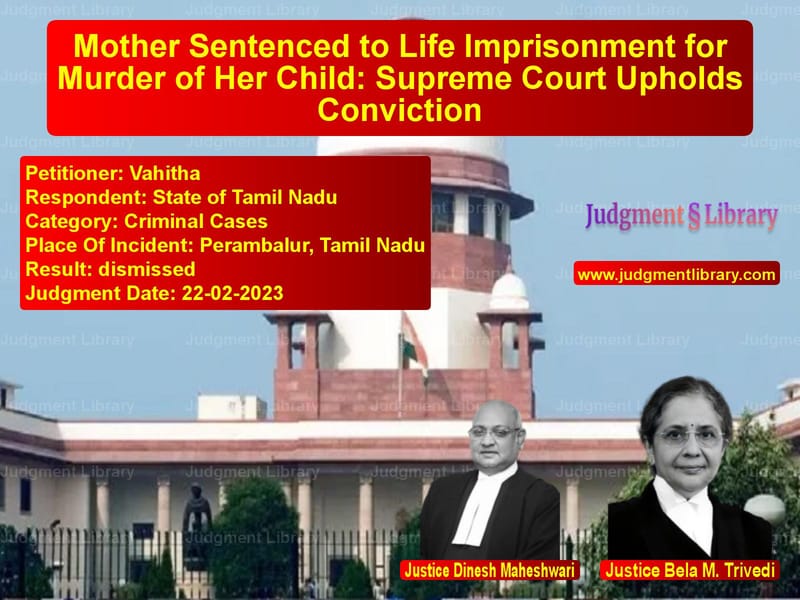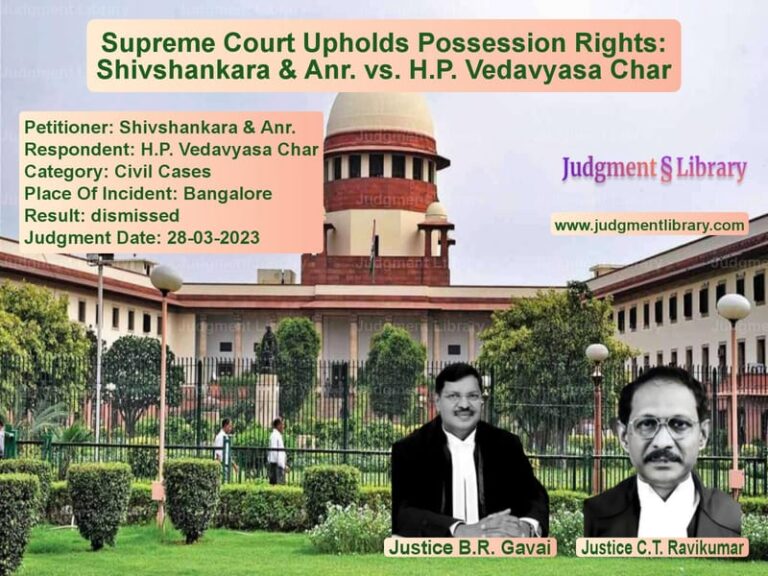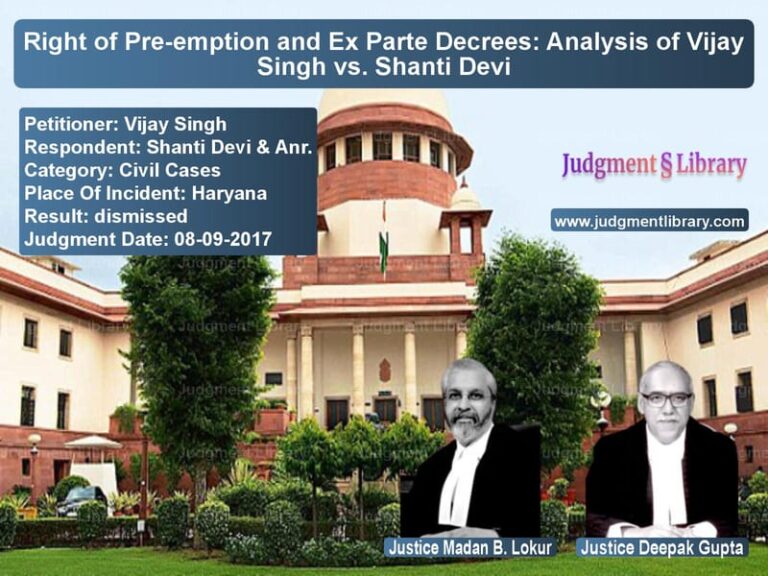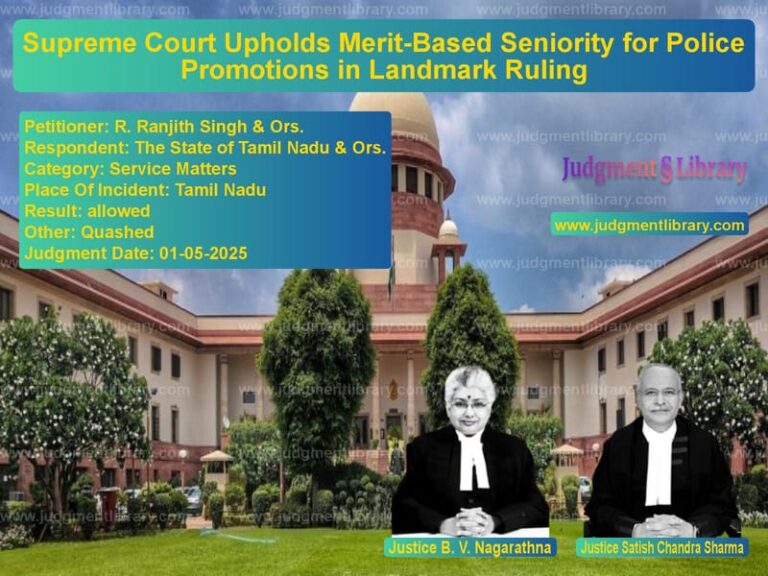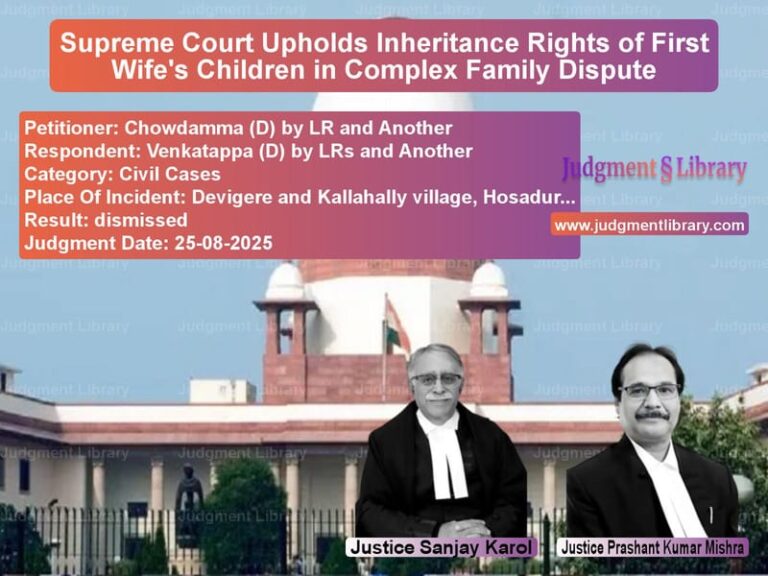Mother Sentenced to Life Imprisonment for Murder of Her Child: Supreme Court Upholds Conviction
The case of Vahitha vs. State of Tamil Nadu involved a deeply tragic incident where a mother was accused of murdering her own five-year-old child. The Supreme Court was called upon to examine whether the conviction of the appellant under Section 302 of the Indian Penal Code (IPC) was justified based on the circumstantial evidence presented by the prosecution. The judgment affirms the principles of last seen theory and the burden of proof under Section 106 of the Evidence Act, reinforcing the legal duty of an accused to provide an explanation when incriminating circumstances are proven.
Background of the Case
The appellant, Vahitha, was convicted for the murder of her five-year-old daughter, Farhana, in her mother-in-law’s house in Perambalur, Tamil Nadu, on June 21, 2007. At the time, her husband was working abroad, and she had been living with her father at Kolakkudi. The prosecution’s case was that she was unhappy living with her mother-in-law and viewed her daughter as an obstacle to her independence. It was alleged that she strangulated the child to death when her mother-in-law had stepped out of the house.
The prosecution relied on the testimony of witnesses who claimed to have seen the appellant alone with the child at the time of the incident. Medical evidence confirmed that the child died due to asphyxia caused by strangulation. The appellant’s conviction was based purely on circumstantial evidence, with the prosecution invoking the principle that the last person seen with the deceased is expected to explain the circumstances leading to the death.
Read also: https://judgmentlibrary.com/supreme-court-ruling-on-dowry-death-case-understanding-section-319-crpc/
Key Issues Before the Court
- Whether the circumstantial evidence was sufficient to prove the guilt of the appellant beyond a reasonable doubt.
- Whether the appellant’s plea of alibi was credible and supported by evidence.
- Whether the prosecution’s case was undermined by inconsistencies in witness testimonies.
- Whether the conviction under Section 302 IPC was justified or if the case fell under a lesser offense.
Arguments by the Appellant
The appellant’s defense was based on several grounds:
“The prosecution has failed to establish a complete chain of circumstances leading only to the guilt of the appellant. There were inconsistencies in the statements of key witnesses, and the plea of alibi was wrongly rejected.”
The appellant contended that:
- She was at her father’s house in Kolakkudi at the time of the incident, as testified by her father (PW-6), and was arrested only when she returned to Perambalur after learning of her daughter’s death.
- There were contradictions in the statements of her mother-in-law (PW-1), who initially claimed she saw the appellant strangling the child but later changed her version.
- There was no direct evidence linking her to the crime, and the entire case was based on suspicion.
Arguments by the Prosecution
The prosecution countered the appellant’s claims by asserting:
“The appellant was the last person seen with the deceased child, and her failure to provide an explanation under Section 106 of the Evidence Act supports the inference of guilt.”
The prosecution further argued:
- Multiple witnesses (PW-1 to PW-5) confirmed that the appellant was present at the scene and had exclusive custody of the child.
- The plea of alibi was not supported by any documentary or independent evidence and was contradicted by prosecution witnesses.
- The post-mortem report corroborated the prosecution’s theory that the child died due to strangulation.
Supreme Court’s Observations
The Supreme Court reaffirmed the legal principles governing circumstantial evidence, particularly the doctrine of the last seen theory and the burden of proof under Section 106 of the Evidence Act. The Court made the following key observations:
- When an accused is the last person seen with the deceased and a clear chain of circumstances is established, the burden shifts to the accused to explain the circumstances leading to the death.
- The plea of alibi must be proven with cogent evidence. In this case, the appellant’s father was the only witness supporting the alibi, and there was no independent corroboration.
- Minor contradictions in witness testimonies do not discredit the entire prosecution case if the overall evidence is consistent and credible.
Final Judgment
The Supreme Court upheld the conviction and sentence, ruling:
- The circumstantial evidence clearly pointed to the guilt of the appellant.
- The appellant failed to provide any plausible explanation regarding her daughter’s death.
- The conviction under Section 302 IPC was appropriate, and there was no basis for reducing the offense to culpable homicide not amounting to murder.
The appeal was dismissed, and the sentence of life imprisonment was upheld.
Legal Implications of the Judgment
This ruling reinforces key legal principles:
- Last Seen Theory: When the accused is the last person seen with the deceased, the burden shifts to them to provide an explanation.
- Plea of Alibi: A mere assertion of alibi is insufficient; it must be supported by strong evidence.
- Consistency in Circumstantial Evidence: A conviction can be based on circumstantial evidence if it forms a complete and unbroken chain leading to the guilt of the accused.
- Burden of Proof Under Section 106: If an accused refuses to explain facts exclusively within their knowledge, an adverse inference can be drawn.
Conclusion
The Supreme Court’s decision in this case underscores the principle that when direct evidence is absent, a well-established chain of circumstantial evidence can be sufficient to convict an accused. The case also highlights the significance of the last seen theory and the legal burden on an accused to provide an explanation when circumstantial evidence overwhelmingly points to their involvement in a crime.
Petitioner Name: Vahitha.Respondent Name: State of Tamil Nadu.Judgment By: Justice Dinesh Maheshwari, Justice Bela M. Trivedi.Place Of Incident: Perambalur, Tamil Nadu.Judgment Date: 22-02-2023.
Don’t miss out on the full details! Download the complete judgment in PDF format below and gain valuable insights instantly!
Download Judgment: vahitha-vs-state-of-tamil-nadu-supreme-court-of-india-judgment-dated-22-02-2023.pdf
Directly Download Judgment: Directly download this Judgment
See all petitions in Murder Cases
See all petitions in Bail and Anticipatory Bail
See all petitions in Juvenile Justice
See all petitions in Judgment by Dinesh Maheshwari
See all petitions in Judgment by Bela M. Trivedi
See all petitions in dismissed
See all petitions in supreme court of India judgments February 2023
See all petitions in 2023 judgments
See all posts in Criminal Cases Category
See all allowed petitions in Criminal Cases Category
See all Dismissed petitions in Criminal Cases Category
See all partially allowed petitions in Criminal Cases Category

